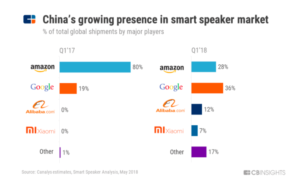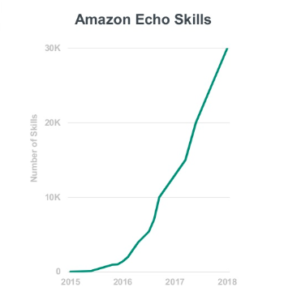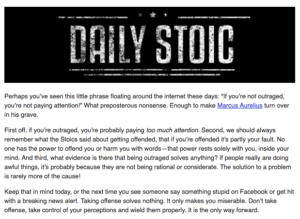Business & Money
Nike is back at all-time highs after earnings.

Howard Lindzon calls Nike one of his 8-80 stocks. That is, a stock you can hold for your entire life with confidence that it will increase in value over the long term.
Howard also refers to Nike as a “fashology” (fashion + technology) stock because people where Nike as much for fashion as they do for its athletic utility/function. I like the term fashology. He also puts Apple and Lululemon in that category.
Some people underestimate the value of a strong brand. It feels squishy and amorphous. But it matters so much in business. For Nike, it means millions or billions of people wearing your stuff in their Facebook and Instagram posts. It means all the 16-year-olds at the park playing basketball are wearing Nike. It means that anyone across the globe immediately recognizes your logo, whether or not the brand name appears alongside it.
When you don’t know something, you don’t “Bing it,” you Google it. I’ve never heard someone say they were planning to “Hulu and chill” tonight. You Netflix and chill. When you need to get somewhere, you call an Uber.
In marketing/advertising land, we call this earned media. Unlike paid media, where you pay to promote your brand on TV or the internet, earned media is purely organic. People are promoting your brand for you. Your brand becomes synonymous with the entire category.
It’s not a bad place to be.
Human Progress
Many are convinced that voice represents the next big paradigm shift in computing. Amazon got out to an early lead shipping millions of echo devices, but Google quickly rushed with their own offering, and now the Chinese giants are following suit.

I’ve been thinking about what brought this about and I can think of two big reasons.
First, voice now “works.” By that I mean that error rates are now sub 5% when they were above 30% five or six years ago. We can easily transcribe voice to text and then turn that text into a structured query.
Second, the smartphone supply chain has made it possible to solve this problem at scale. Anyone can assemble a small box with a CPU, microphones, speakers, sensors, plug it up to an internet connection to tap into voice recognition and natural language processing capabilities from a whole host of companies.
But there’s a big question: what’s the killer app? Why do many voice services still suck (I’m looking at you Siri)?
Here’s a list of things voice assistants are fairly competent at:
Playing music and podcasts
Setting alarms and timers
Checking the weather
Dictating and sending messages
Reordering previously purchased items
Listing random shower thoughts (if you haven’t tried this one, ask Alexa to play “random shower thoughts” right now)
I’m probably missing a few, but that’s about it. If I really put my mind to it, I might be able to make a list of 20 or 30 simple and discrete tasks. It’s pretty pathetic. Or is it?

So there are actually over 30,000 things that Alexa can do. But this presents a massive problem. There’s no way a human being can remember a list of 30K discrete skills.
So there’s a ton of things it can do, but there’s no easy way to know what it can and can’t do. That’s a massive UX problem.
For this reason, as it stands today, voice services (similar to other areas of machine learning and AI), serve best when the exists as a part of a particular domain. Alexa on my TV works great to search for content. Switching apps and using the remote to type in a search query sucks. Now I can say, find “The Fast and The Furious, Tokyo Drift” (fantastic movie… don’t you dare say otherwise).
Hotel rooms offer another narrow domain in which the list of possible things you might ask for is fairly constrained.
For broader applications, it remains to be seen whether voice will have the transformational impact that many are hoping for.
Philosophy
Many of you will have received handwritten letters or obnoxiously long emails from me (it probably won’t be the last). It is on purpose.
One of my favorite books is How To Win Friends and Influence People. It’s fantastic! One of the core principles is that all people have a desire to feel important.
Writing longer-form content is inconvenient. Social media and media outlets in general have trained us to like stackable content. It’s easier to consume and takes less time. So when you write something a bit longer it conveys a sense of importance. It says, “I care enough about this topic enough to spend more than a few moments composing it.” And conveying that to important people in my life is, well, important to me.
And interrupting people is a great way to communicate that they’re NOT important. It says “I care about what I have to say far more than what you have to say.” So taking the time to write something down and flesh our your thoughts ensures that, if you give that writing to someone else, there is no chance of being interrupted. For this reason, the wife and I have adopted the practice of sometimes writing letters to each other when we get frustrated about something.
And finally, writing things down seems to me like a great way to separate yourself from your thoughts and ideas. When thoughts are in your mind, they’re inextricable from you as a person. Inextricable from your identity. You might say you are your thoughts. But writing them down changes that. You can look back on your writings to analyze how your thinking has changed and identify weak points in your perspective. It’s the reason why, at the end of each quarter I go back to read the VIC issues of the last 3 months, and at the end of the year I read through my journal entries for that year.
From that angle, it becomes easy to see that your thoughts and ideas are just that, thoughts and ideas. And that they can, and often should, change and evolve or time.
My Latest Discovery
I’ve written here many times about Stoicism. If you’re a fan, perhaps you want to try subscribing to The Daily Stoic, a short daily email with timeless words of wisdom from this 2,0000 year old philosophy.

Thanks to a good friend for forwarding this one along last week!